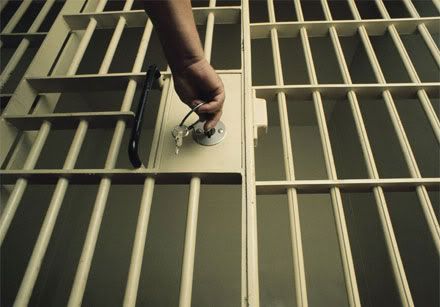 Back in 1984 Calvin Burdine was convicted in the stabbing death of his gay lover, who had been trying to pimp him out. The prosecuting attorney asked the jury to award Burdine the death penalty rather than life in prison, claiming that sending a gay man to prison was like sending a kid to a candy store.
Back in 1984 Calvin Burdine was convicted in the stabbing death of his gay lover, who had been trying to pimp him out. The prosecuting attorney asked the jury to award Burdine the death penalty rather than life in prison, claiming that sending a gay man to prison was like sending a kid to a candy store.
The jury agreed in only 17 minutes. The judge also thought it sounded reasonable.
Fortunately, Calvin got a new trial since his public defender slept through the first one.
How ugly is that?
The reality that GLBT people experience in prison is far removed from the myth. A young man named Rodney tells it like it is here.
I’ve heard before that ‘jail is a faggot’s dream.’ I assure you that cliché is not the case. Gay men who do not attempt to hide their sexuality are forced into passive and submissive roles. To live with some standard of equality, we have to trade in our manhood. We are completely emasculated. It’s a form of technical castration. The role of woman is forced upon us and any rebuttal is considered a sign of disrespect. My way of thinking about myself and my sexuality has been permanently altered.
–Rodney
And if that is how gay men are treated in prison, can you imagine the life of a transwoman sent to a men’s prison?
I know the saying:
| If you can’t do the time, don’t do the the crime. |
But that’s not always easy for transwomen. Survival depends on income, just like it does for everyone else. But legitimate employment is a scarce resource for transpeople. Is it any wonder then that some transwomen may turn to occupations like sex work and/or dealing drugs? The underground economy is always booming, even in bad economic times.
 Mimi McNair went to an Atlanta emergency room last December with an infected finger. Not wanting to show her iID, which names her as Floyd McNair, she used her aunt’s medicaid card. She is now in her second month in Cook County jail, awaiting extradition to Atlanta, having been arrested on an unrelated theft charge Chicago.
Mimi McNair went to an Atlanta emergency room last December with an infected finger. Not wanting to show her iID, which names her as Floyd McNair, she used her aunt’s medicaid card. She is now in her second month in Cook County jail, awaiting extradition to Atlanta, having been arrested on an unrelated theft charge Chicago.
I hate that I did what I did to come here. I guess it was an eye-opener. Jail is not the place to be, whether I’m safe or comfortable.
–Mimi NcNair
Mimi is better off than some incarcerated transwomen because Cook County has an enlightened policy…somewhat.
They include a Gender Identity Committee-whose name will soon be changed, according to officials-that meets weekly and makes individualized recommendations for each inmate who self-identifies as transgender. The policy is in collaboration with Cermak Health Services of Cook County, the healthcare provider for Cook County Jail.
Cook County sheriff Thomas Dart is responsible for the new policies.
My job at the jail is to be sure people show up and they’re safe, and don’t harm others and don’t get harmed. And to ignore the fact that people were going through some degree of changes was just beyond stupid.
–Thomas Dart
The policy, which cites the Eighth and Sixteenth Amendments and the Illinois Human Rights Act as the top three authorities, provides guidelines and procedures that address transgender inmates’ housing, clothing and grooming, among other aspects of jail life. It’s part of a broader effort under the Prison Rape Elimination Act of 2003. Other, similar policies are in place in Washington, D.C., San Francisco and Miami.
Notice that Atlanta is not included in that list. So if she is extradited, Mimi’s life will change dramatically.
If there wasn’t a transgender committee [here], it would be hell and treacherous.
–Mimi McNair
Mimi has chosen to be housed in protective custody (solitary confinement) for the sake of safety. The fact that she has breasts would put her in danger if she was housed with the general population.
But transwomen such as Mimi and another named Kelis at least have access to their hormones while in jail.
I’d feel they were forcing me to be a male, being that I am in jail. It’s one thing to have me locked up, it’s another thing to make me locked up and look like a man.
–Kelis, who has since been released
Dr. Kameron Matthews is the primary care physician for all the transgender inmates at Cook County Jail. She says that the hormones a medical necessity, and stressed that a majority of the inmates come to jail having already taken hormones.
Once they are on the treatment, it is hazardous to their health to stop it abruptly or stop it at all.
We’re not providing them with rights or any privileges that aren’t deemed the rights and privileges of other inmates. It’s just because they are deemed a more vulnerable population that we need to outwardly and proactively speak to their safety.
–Dr. Kameron Matthews
Right-wingers are, of course, up in arms about any positive treatment of transpeople while incarcerated. Most recently, they have been extremely outraged that ICE policy is to continue hormone therapy for transpeople who are detained as illegal immigrants and are on hormones at the time they were detained.
One portion of the population displays that they truly have no understanding of the issue. In response to a new program to provide LGBT point-people in each prison, the wingers see it as promoting homosexual rape in prison. There is no understanding that the homosexuals are rarely the rapists there, but rather the targets.
Those who wish to know more about the subject are invited to explore the book, Captive Genders: trans embodiment and the prison-industrial complex.
The history of trans and queer people in the United States is also a history of incarceration and the struggles against incarceration.
–Eric A. Stanley, co-editor
Captive Genders is an exciting assemblage of writings — analyses, manifestos, stories, interviews — that traverse the complicated entanglements of surveillance, policing, imprisonment, and the production of gender normativity.
–Angela Y. Davis
Julia C. Oparah, professor and chair of Ethnic Studies at Mills College, contributed a piece on how feminists involved in prison abolition work can sometimes undermine the experiences of transgendered people. Many feminists, Oparah said, “assume that all women prisoners are in women’s prison. Actually turns out not to be the case.” Often times, Oparah explains, transwomen end up in men’s prisons where they face sexual harassment and humiliation.
Case in point: New Zealand Corrections Minister Anne Tolley:
I am not persuaded that the law should be change to require prisoners who identify as female, but retain male anatomy, must be placed in women’s prisons.
A man who is transgender, but pre-surgery, is still a man.
When a trans person is sent to the wrong prison, the following problems can arise:
- Psychological damage may be caused by being treated as a member of the wrong gender. For example, no man wants to be treated as if he were a woman and vice versa.
- Physical and sexual abuse may occur. This type of abuse towards trans prisoners is fairly common.
- Rehabilitation may be inhibited. Psychological damage and physical and sexual abuse will make rehabilitation even more difficult than it would otherwise be.
–Cherise Witehira, President, Agender NZ Incorporated
In the United States, even at more “enlightened” facilities like Cook County Jail, housing of inmates is largely based on anatomy. An orchiectomy (removal of testicles) may be the basis for housing in a women’s facility, but that is not guaranteed.
Mimi fears being assaulted or raped amongst the general population.
People look at [us] like we are the nastiest and most disgusting people on Earth.
Solitary confinement is detrimental to transpeople as well, especially for those fighting deportation.
“It’s harder to prepare a case for someone who is spending 23 hours a day in administrative segregation. It’s hard for them to get out and call me. It’s harder for them to get out and call whatever legal advocate might be helping them,” said Cara Jobson, a San Francisco attorney. Jobson represented Lawrence and has handled hundreds of cases involving immigrant LGBT detainees for more than 10 years.
Grace Lawrence, the lead focus of this last article, came to this country from Liberia.
As a transgender woman from Liberia, the thought of returning to her home country was unbearable. Lawrence had witnessed individuals there burned alive for being gay. But the thought of enduring one more day in administrative segregation – or solitary confinement – was just as unnerving. It was frustrating to be unable to communicate with the outside world, not even with the lawyer who was helping her seek asylum.
Grace was released from ICE custody in 2009 and now works with the TGI Justice Project in San Francisco.
In her report Punishing the Innocent: How the Classification of Male-to-Female Transgender Individuals in Immigration Detention Constitutes Illegal Punishment Under the Fifth Amendment, Laurel Anderson, from the Executive Office of Immigration Review, argues
ICE must find less punitive ways to house transgender detainees, such as not relying on the use of confinement as the only way to ensure their safety. She also suggests that ICE expand an existing provision that would allow detainees to be released from custody if they are applying for asylum and have credible grounds for fear of persecution in detention.

1 comment
Author
I’ve spent time in jail. And in the military, I spent time on the outside of the bars as a correctional specialist. So I know a little bit about what prison is like. In fact, between you and me, I’m probably the only one of us educated in the theory of incarceration. That may be something to bear in mind.
From the TGI Justice Project:
And don’t even get me started on privately run prisons. Privately run immigration prisons have been accused of torture in their treatment of transpeople by UN Special Rapporteur Juan Mendez. That part of his report was buried under the part of his report about Bradley Manning.
The abuses are all the more distressing because the detainees involved are being held on civil, not criminal, charges, according to Lambda Legal.